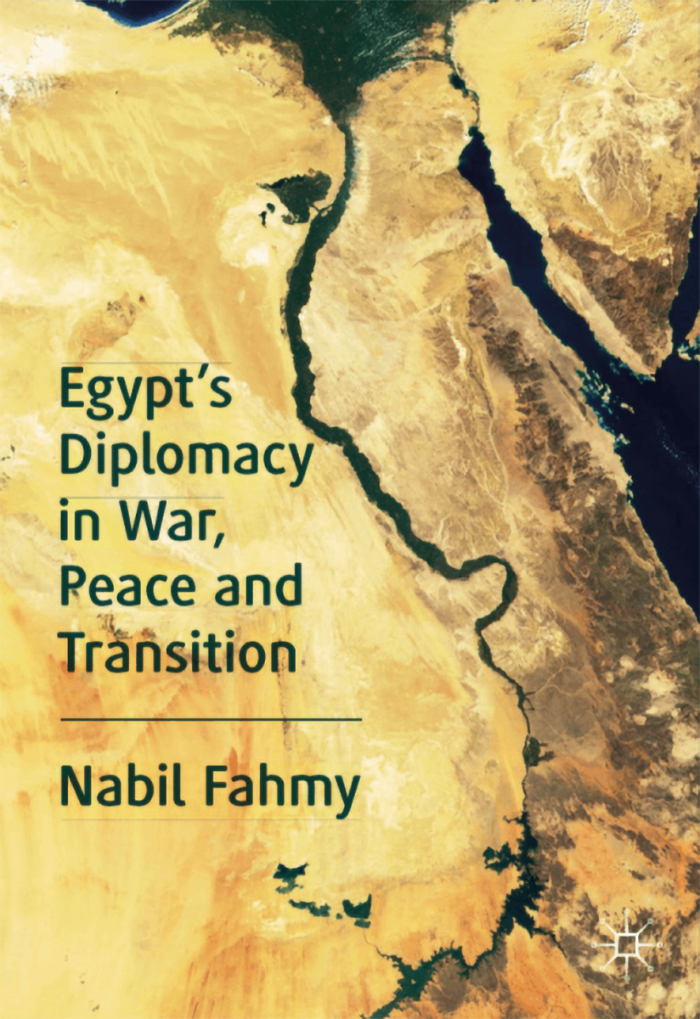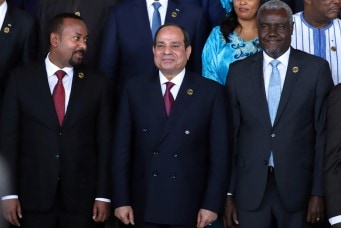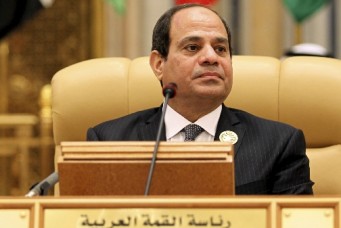Egypt’s Diplomacy: An Insider’s Critique
Former Egyptian Foreign Minister Nabil Fahmy’s newest book seeks to inform future generations about the challenges of statecraft he and his compatriots faced over the past fifty years.
Egypt’s Diplomacy in War, Peace and Transition. By Nabil Fahmy, Palgrave Macmillan, London, 2020, 377 pp.
“The past two generations in the Arab world [are] handing over the Middle East to future generations in a far worse state than it was when they took charge of it. The least we could do was to share our experiences for others to learn from.”
Thus former Egyptian Ambassador and Foreign Minister Nabil Fahmy begins his new book Egypt’s Diplomacy in War, Peace and Transition.
Indeed, when Fahmy started his diplomatic career in 1974 the Arab world was still fairly united, Egypt was at the zenith of its international influence, and the hopes attached to secular nationalist modernizing states had not yet collapsed. Today, the Arab world is in various conditions of collapse and disarray, Egypt’s regional leadership is in eclipse, and the once promising and modernizing states of the region have been challenged by Islamists, youth uprisings, and their own authoritarianism and bureaucratic decay.
Yet, this makes Fahmy’s contribution all the more urgent and timely. He presents major transformative events in Egyptian foreign policy in their broad context, but also walks the reader through the meetings and personal encounters that often make up the inner workings of history. Fahmy also draws on the career of his illustrious father, former Foreign Minister Ismail Fahmy, and hence gives the book a longer historical reach than the author’s own career.
The book is written in an engaging style—part memoir, part historical and political analysis—and is divided into four parts. The first focuses on Fahmy’s own personal trajectory. The second examines Egypt’s Foreign Policy. The third looks at Egypt’s domestic upheavals in the past decade, and the fourth presents a vision for a more stable and cooperative Middle East.
In the substantial second part of the book, Fahmy positions Egypt in the region’s main geopolitical developments. He examines the 1967 war and the end of Arab nationalism, the 1973 war and the complex path of peace with Israel, the attacks of 9/11 followed by the United States invasion of Iraq and the eruption of the War on Terror. Throughout, Fahmy charts the role Egypt and its diplomats endeavored to play, promoting the principles of centrism, moderation, and modernity in a region that was growing increasingly divided and radicalized by religious extremism and sectarianism.
Fahmy also devotes substantial chapters to key issues, such as Egypt’s sustained efforts to negotiate a nuclear weapons free zone in the Middle East, relations with the returning regional powers of Turkey and Iran, and the complex relationship with the United States. Throughout, he emphasizes that Egypt has no choice but to be true to its identity as a large centrist power, with enduring interests in regional stability and cooperation, and a complementary set of relations with the world’s great powers: the United States as a main partner, and Russia and China as emerging powers with much to offer in certain sectors.
What the reader might wish Fahmy could have elaborated on is why Egypt has lost so much regional and international sway from the heydays of the 1960s and 1970s, and how it can regain its role. If money is power, in recent years Egypt has lost out to the rich Arab states of the Gulf. Fahmy could have discussed more how Egypt will be able to chart an independarabent foreign policy all the while continuing to be economically beholden to its rich Gulf economic partners and benefactors.
Importantly, Fahmy discusses Egyptian soft power, both past and present. The book reminds readers that the late President Gamal Abdel Nasser’s revolution, rhetoric, and defiance cast a long soft-power shadow throughout the Arab world in the 1960s. Meanwhile, Fahmy explains that the youth uprising in Egypt in 2011 cast a long shadow throughout the region and led to youth revolts in many other Arab countries. It is easy then to postulate that had the Muslim Brotherhood (first) and then the Egyptian Military (second) not suppressed the youth uprising in Egypt, a democratic transition in Egypt would have put Egypt once again in the position of being a soft power leader of the Arab world.
“Egypt has been in an extended state of transition . . . since 1952, not 2011.” This is how Fahmy begins the third part of the book, on Egypt’s domestic ups and downs, and particularly the troubled period since 2011. He was in Egypt when the revolution broke out, and gives a fascinating and detailed account of developments that he saw firsthand among various government and opposition figures during that time of upheaval, and an assessment of the difficult year of Muslim Brotherhood rule.
He was a minister of foreign affairs in the first post-Mohamed Morsy administration and explains how he tried to recalibrate and diversify Egypt’s foreign policy. However, this section on Egypt’s domestic upheavals, rich with detail and passion, ends without positing the key question of why Egypt has not been able to transition to a more representative state in the past seven decades, let alone the past seven years.
In the fourth and final part, Fahmy calls for a more proactive Arab diplomacy, with a renewed role for Egypt, in working to de-escalate conflict and bring stability and regional cooperation to the Middle East. He accurately asserts that unless four of the main players—Turkey, Egypt, Saudi Arabia and Iran—can de-escalate from their shared conflicts and move forward toward understanding and cooperation, there is little hope for a stable region.
Egypt’s Diplomacy is a must-read book for anyone interested in the Middle East’s modern history and the important but challenging role that Egypt has played in various junctures. It is a book rich with important detail, engaging anecdotes, as well as broad insights and observations. As such, it is a significant addition to the still small library of Arab officials and leaders reflecting on their successes and failures for the benefit of coming generations.
Paul Salem is the Vice President for International Engagement. He served previously as MEI’s President and CEO. He is currently based in the Middle East and works on building partnerships throughout the region. His research focuses on issues of political change, transition, and conflict as well as the regional and international relations of the Middle East. Salem is a frequent commentator on US and international media, and is the author and editor of a number of books and reports including Escaping the Conflict Trap: Toward Ending Civil Wars in the Middle East (ed. with Ross Harrison, MEI 2019); Winning the Battle, Losing the War: Addressing the Conditions that Fuel Armed Non State Actors (ed. with Charles Lister, MEI 2019); From Chaos to Cooperation: Toward Regional Order in the Middle East (ed. with Ross Harrison, MEI 2017), Broken Orders: The Causes and Consequences of the Arab Uprisings (In Arabic, 2013), “Thinking Arab Futures: Drivers, scenarios, and strategic choices for the Arab World“, The Cairo Review Spring 2019; Bitter Legacy: Ideology and Politics in the Arab World (1994), and Conflict Resolution in the Arab World (ed., 1997). Prior to joining MEI, Salem was the founding director of the Carnegie Middle East Center in Beirut, Lebanon between 2006 and 2013. From 1999 to 2006, he was director of the Fares Foundation and in 1989-1999 founded and directed the Lebanese Center for Policy Studies, Lebanon’s leading public policy think tank. Salem is also a musician and composer of Arabic-Brazilian jazz. His music can be found on iTunes.
Read More



